Saving India’s social fabric
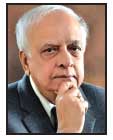 Hari Jaisingh
Hari Jaisingh
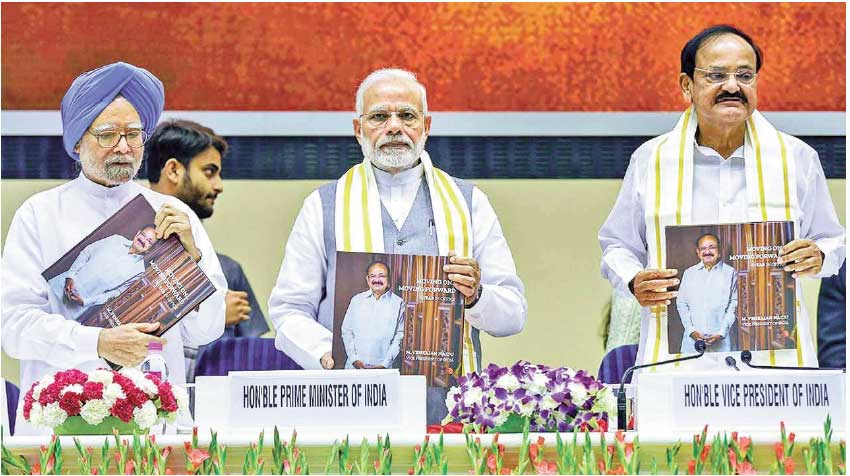 Prime Minister Narendra Modi and his predecessor Manmohan Singh at Vice-President M Venkaiah Naidu’s
book release function in New Delhi.
Prime Minister Narendra Modi and his predecessor Manmohan Singh at Vice-President M Venkaiah Naidu’s
book release function in New Delhi.
On the occasion of the release of V i c e - P r e s i d e n t Venkaiah Naidu’s book on September 2 in New Delhi, Prime Minister Narendra Modi said that ‘calling for discipline’ is not being ‘autocratic’. I wonder what the Prime Minister is really talking about ! Is he saying we as a people tend to be undisciplined, while the Indians working overseas are a disciplined lot ? Has the Prime Minister given a serious thought to this swadeshi and videshi setting, notwithstanding his numerous trips overseas during the last over four years of the BJP-led NDA regime? It is worthwhile for Prime Minister Modi to mull over the issue. Equally relevant is the larger question of why Indians are mostly success stories abroad while the people here have to run from pillar to post to establish themselves professionally. The problem here is one of creating the right professional environment, and not pursuing the politics of favouritism. There may be some improvement in the working of the country’s bureaucratized system. But looking at the evolution of the Indian polity over the years, I have come to realise the dangers of a centralized polity which has thrown up a restless electorate and created wide-ranging social
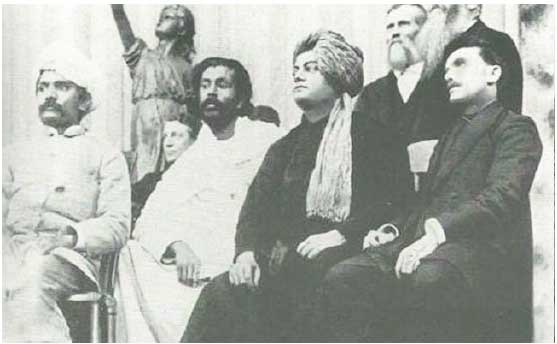 A picture of Swami Vivekananda at the historic Parliament of
Religions, in Chicago, in 1893. conflicts, at different places in different times. I am not looking at past happenings. I have discussed such events in my books. I am more concerned about happenings in recent years. Take the growing threat of lynching. It is not mere “mobocracy”, but the absence of the Fear of Law which creates an atmosphere of indiscipline. This, in turn, makes the persons with “right political connections” feel that they could get away with their acts of crime. The police records such lynching incidents as “cow smuggling, animal cruelty, rash driving and road rage”. What is not being realized by the Modi establishment is that such violent acts directed against a section of society tear apart the “pluralistic social fabric” of the country. What is equally disquieting is that such attitudes throw up a climate of intolerance, hate and political impunity, away from our value-based Liberal Hinduism. This is not a healthy sign for Prime Minister Modi’s agenda of vikas.
A picture of Swami Vivekananda at the historic Parliament of
Religions, in Chicago, in 1893. conflicts, at different places in different times. I am not looking at past happenings. I have discussed such events in my books. I am more concerned about happenings in recent years. Take the growing threat of lynching. It is not mere “mobocracy”, but the absence of the Fear of Law which creates an atmosphere of indiscipline. This, in turn, makes the persons with “right political connections” feel that they could get away with their acts of crime. The police records such lynching incidents as “cow smuggling, animal cruelty, rash driving and road rage”. What is not being realized by the Modi establishment is that such violent acts directed against a section of society tear apart the “pluralistic social fabric” of the country. What is equally disquieting is that such attitudes throw up a climate of intolerance, hate and political impunity, away from our value-based Liberal Hinduism. This is not a healthy sign for Prime Minister Modi’s agenda of vikas.
I hold Swami Vivekanand as a role model for India. I have also striven to make an objective assessment of India in all fascinating facets. I have peeped into the past and have had a close look at the ancient theories of dharma and karma and the Indian attitude of accepting misfortunes as the will of God. Religion is still a potent fact in individual and community life. But what seems to be playing havoc with the polity today is the mixing of distorted facets of religions with politics of expediency.
Let me recall Swami Vivekanand’s famous Chicago address of September 11, 1893. Besides, showing the face of Hinduism of tolerance and respect for other religious faiths to the rest of the world, he said, “I fervently hope that the bell tolled this morning in honour of this convention may the deathknell of all fanaticism.” Well, we cannot go back to the age of barbarianism as practised by fanatic elements of various religious groups. I hold Swami Vivekanand as a role model for India. I have also striven to make an objective assessment of India in all fascinating facets. I have peeped into the past and have had a close look at the ancient theories of dharma and karma and the Indian attitude of accepting misfortunes as the will of God. Religion is still a potent fact in individual and community life. But what seems to be playing havoc with the polity today is the mixing of distorted facets of religions with politics of expediency. Even in areas of explosive sensitivity in the social arena, selective religious passages are being used as instruments of politics. This has had its fallout, both on the communal divide and in the growth of fundamentalism. Increasing communalization, blatant criminalization of politics and the Hindu backlash --- all are sad pointers to volcanic social and political settings that we see today. This puts the Indian electorate on the horns of a dilemma. Of course, dreams of a rosy future are sold by the dozen. This is a favourite pastime of our politicians. They first sell dreams and then exploit them for selfaggrandisement.
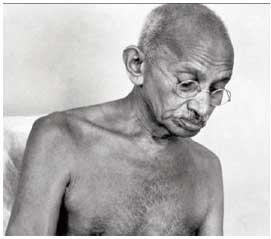 Mahatma Gandhi They even do not hesitate to exploit the pangs of poverty to obtain votes. And we all are faced with a vicious circle of votes and notes, throwing up in the process, a parallel economy of what is called the “black money economy”.
Mahatma Gandhi They even do not hesitate to exploit the pangs of poverty to obtain votes. And we all are faced with a vicious circle of votes and notes, throwing up in the process, a parallel economy of what is called the “black money economy”.
Over a long period of time, the black economy has become more powerful than the official economy. This sounds paradoxical in the land of Mahatma Gandhi whose mantra was simple living and high thinking. The Grand Old Gandhi survives today by courtesy of Richard Attenborough.
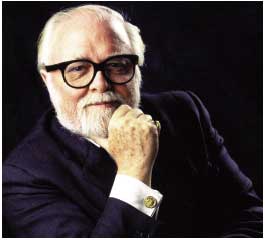 Richard Attenborough True, democracy is a ‘live’ thing in India today, despite numerous hurdles. However, the drift is towards chaos. I expect the Prime Minister to give serious thought to all matters and issues raised in this short piece. I am not discussing in detail the highprofile arrests of human rights activists recently by the Pune police on the charge of being “active members” of the banned Communist Party of India
Richard Attenborough True, democracy is a ‘live’ thing in India today, despite numerous hurdles. However, the drift is towards chaos. I expect the Prime Minister to give serious thought to all matters and issues raised in this short piece. I am not discussing in detail the highprofile arrests of human rights activists recently by the Pune police on the charge of being “active members” of the banned Communist Party of India
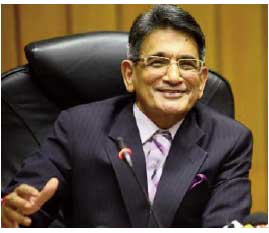 R M Lodha (Maoists) and an “Anti-Fascist Front” “to overthrow the democratic government of the country. The police failed to file a charge-sheet against them after 90 days of the January 1 “violence” in Bhima Koregaon.
R M Lodha (Maoists) and an “Anti-Fascist Front” “to overthrow the democratic government of the country. The police failed to file a charge-sheet against them after 90 days of the January 1 “violence” in Bhima Koregaon.
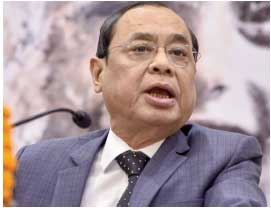 Ranjan Gogoi Still, The Pune court has been gracious enough to grant them 90 days more to finalise the chargesheet!
Ranjan Gogoi Still, The Pune court has been gracious enough to grant them 90 days more to finalise the chargesheet!
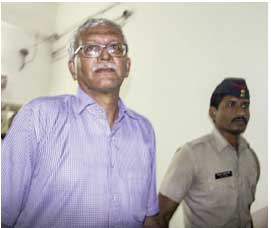 Vernon Gonsalves was one of the
three arrested activists produced
in the Pune sessions court I do not wish to go into the
merits of the issue since the
matter is under consideration
of the Supreme Court.
However, what needs to be
noted seriously by the powersthat-
be is interim observations
by the apex court. It said,
“dissent is the safety of
democracy. If it is not
allowed, the pressure cooker
will burst”. This is a clear
warning to the Modi
establishment on how not to
govern and handle the wheel of
Indian democracy.
Former Chief Justice of India
R M Lodha has said that the
arrests of these civil rights
activists are “an attempt to
suppress the dissent voice” and
are “an attack on freedom of
speech and an act to
undermine the fundamentals
of constitutional democracy”.
Vernon Gonsalves was one of the
three arrested activists produced
in the Pune sessions court I do not wish to go into the
merits of the issue since the
matter is under consideration
of the Supreme Court.
However, what needs to be
noted seriously by the powersthat-
be is interim observations
by the apex court. It said,
“dissent is the safety of
democracy. If it is not
allowed, the pressure cooker
will burst”. This is a clear
warning to the Modi
establishment on how not to
govern and handle the wheel of
Indian democracy.
Former Chief Justice of India
R M Lodha has said that the
arrests of these civil rights
activists are “an attempt to
suppress the dissent voice” and
are “an attack on freedom of
speech and an act to
undermine the fundamentals
of constitutional democracy”.
I also wish to recall certain
observations of India’s next CJI
Justice Ranjan Gogoi at the
Ramnath Goenka Memorial
Lecture in New Delhi.
Underlining the divide
between “two Indias” – one
that believes that it is the “new
order” and another that lives
below a ridiculously drawn
poverty line. He called for a
“constitutional moment” of the
judiciary which, he said, “has
been long been overdue”.
Indeed, the time has come
for introspection on growing
negative trends in India’s
polity. To check this politics of
negativism, Justice Gogoi has
underlined the need for
“noisy judges, independent
journalists, judiciary on the
front foot”.
Well, we have to put the
best foot forward to undo the
process of killing India’s
traditional social fabric which
derives its strength from
tolerance, understanding, mutual
respect for other religious faiths
and secular ethos.




 Hari Jaisingh
Hari Jaisingh Prime Minister Narendra Modi and his predecessor Manmohan Singh at Vice-President M Venkaiah Naidu’s
book release function in New Delhi.
Prime Minister Narendra Modi and his predecessor Manmohan Singh at Vice-President M Venkaiah Naidu’s
book release function in New Delhi. A picture of Swami Vivekananda at the historic Parliament of
Religions, in Chicago, in 1893.
A picture of Swami Vivekananda at the historic Parliament of
Religions, in Chicago, in 1893. Mahatma Gandhi
Mahatma Gandhi Richard Attenborough
Richard Attenborough R M Lodha
R M Lodha Ranjan Gogoi
Ranjan Gogoi Vernon Gonsalves was one of the
three arrested activists produced
in the Pune sessions court
Vernon Gonsalves was one of the
three arrested activists produced
in the Pune sessions court